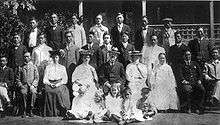George Heber Jones
George Heber Jones (14 August 1867 – 11 May 1919) was an American Christian missionary in Korea.[1] Jones, who grew up in Utica, New York, is notable as the first Protestant missionary in Korea who took an academic approach to the research of Korean religions.
| George Heber Jones | |
 George Heber Jones (front center) during a 1906 visit to the Honolulu Methodist Church | |
| Korean name | |
|---|---|
| Hangul | 조원시 |
| Hanja | 趙元時[1] |
| Revised Romanization | Jo Won-si |
| McCune–Reischauer | Cho Wǒnshi |
| Phonetic transcription | |
| Hangul | 존스 |
| Revised Romanization | Jonseu |
| McCune–Reischauer | Chonsŭ |
Mission in Korean
He arrived in Korea in 1887 as a Methodist minister; while there, he not only made major contributions to the spread of Christianity in Korea, but also founded three academic journals: The Korean Repository, The Korean Review, and Shinhak Wolbo (Theology Monthly).[2][3] He also played a significant role in encouraging Korean immigration to Hawaii; of the first ship of Korean migrant laborers bound for Hawaii to work on sugar plantations there, which departed on 22 December 1902, more than half came from his church in Incheon.[4][5] In July 1907, he was the subject of a murder attempt; Yale University professor George Trumbull Ladd attributed the attack to opinions Jones had expressed in an article he wrote about the suppression of a Korean riot, in which he praised the Japanese police.[6] In general, Jones had a high opinion of Koreans but not of the conditions in Korean society; in particular, he wrote high praise for Korean migrants in Hawaii, attributing their success in their adopted land to their liberation from "the oppressive weight of past tradition, language, [and] association".[7] He died in Miami, Florida on 11 May 1919 after a long illness; his funeral was held in Leonia, New Jersey four days later.[8][9] His Korean name was 조원시(Jo Won-si).
Personal Life
He was married to Margaret Josephine Bengel.[10]
References
- "George Heber Jones, 1867.8.14-1919.5.11" (in Korean). The Korean Methodist Church. 2005-12-01. Archived from the original on 2012-12-19. Retrieved 2007-09-29.
- Kim, Chong-suh (1994). "Early Western Studies of Korean Religions". In Dae-sook Suh (ed.). Korean Studies: New Pacific Currents. University of Hawaii Press. pp. 148–150. ISBN 082481598X.
- Anderson, Gerald Harry (1999). "Jones, George Heber". Biographical Dictionary of Christian Missions. Wm. B. Eerdmans Publishing. pp. 340–341. ISBN 0802846807.
- Hurh, Won-moo (1998). The Korean Americans. Greenwood Press. p. 22. ISBN 031329741X.
- Lee-Murabayashi, Duk-hee (2002). "Early Membership of Korean Methodist Churches in Hawaii" (PDF). Centennial Celebration of Korean Immigration to the United States. Center for Korean Studies, The University of Hawaii at Manoa. Retrieved 2007-09-29.
- Ladd, George Trumbull (1908-03-26). "Koreans a Bloody Race; Attempted Assassination of Mr. Stevens Not an Isolated Case". The New York Times. Retrieved 2007-09-21.
- Patterson, Wayne (2000). The Ilse: First-Generation Korean Immigrants in Hawaii, 1903-1973. University of Hawaii Press. pp. 31–33. ISBN 0824822412.
- "Obituary #1". The New York Times. 1919-05-13. Retrieved 2007-09-30.
- "Obituary #2". The New York Times. 1919-05-14. Retrieved 2007-09-29.
- The diary of Rosetta Hall 2, p229